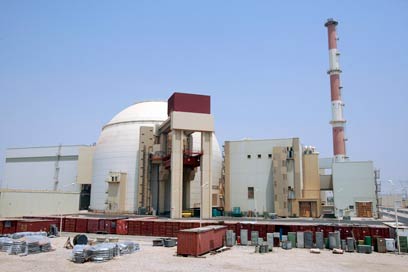Iran determined as ever to get nuclear bomb
Analysis: Installation of some 180 highly advanced centrifuges at Natanz plant proves Tehran has no plans to accept West's demands
The new report the International Atomic Energy Agency will submit to its Board of Governors at the end of the month does not point to any dramatic developments in Iran's nuclear program, but it does indicate that the Islamic Republic continues to develop the capability to "race toward a nuclear bomb" within a few weeks from the moment Supreme leader Khamenei and his people give the order.
Most concerning is the installation of some 180 highly advanced IR-2m centrifuges at the Natanz nuclear plant. These centrifuges, as soon as they are activated, will be able to enrich uranium three or four times faster that the less advanced centrifuges Tehran received from Pakistan. Last month Iran informed the IAEA of its plans to activate the new centrifuges, and now it appears that it will implement this plan.
It is important to note that the advanced centrifuges have yet to be activated. It is also important to note that only some of them are whole, while the rest are actually just empty centrifuge casings. Moreover, 180 centrifuges make up only one cascade (one cascade usually includes 174 centrifuges). An effective uranium enrichment process requires a number of cascades.
However, IAEA experts who have visited the facility in Natanz reported that the more advanced centrifuges have already been hooked up to other cascades of old centrifuges. The IAEA report, according to news agencies, also says Iran has already accumulated 167 kilograms (about 370 pounds) of medium-enriched uranium containing 20% of the fissile isotope 235U. An additional 28 kilograms (about 62 pounds) of uranium enriched to this level is being used to produce fuel rods for the nuclear research reactor in Tehran and perhaps for the heavy water research reactor Iran is building in Arak.

Good news from Bushehr reactor (Photo: Reuters)
This is actually the good news, as Prime Minister Benjamin Netanyahu determined during his address at the United Nations General Assembly that Iran would cross the "red line" once it acquires 240-250 kilos of 20% enriched uranium. With this amount of 20% material it would take Iran a month or two to produce 26-28 kilos (57-62 pounds) of uranium enriched to 93%, which can be used to build one nuclear warhead. The fact that Iran is producing 20% uranium at a pace of 15 kilos a month means it could have accumulated enough material for a nuclear warhead by the spring, but the fact that it uses some of the uranium to produce fuel rods slows down the process.
According to experts in the West, Iran is purposely slowing down the pace of the enrichment of uranium to 20% to avoid harsher sanctions and a possible confrontation with the West and Israel. Iran has recently been hit with new sanctions that make it harder for the country to be paid in cash for the oil it exports.
Another positive development is Iran's recent announcement that it was forced to shut down the nuclear reactor for the production of electricity in Bushehr. Iran did not explain why, but based on previous incidents, it is safe to assume that the Russians and Iranians are having trouble producing electricity at full capacity due to technical difficulties. The Bushehr reactor was also damaged by the Stuxnet computer virus, which penetrated it some four years ago. But technical malfunctions delayed work at the plant for more than a year even before it was infected by the computer virus.
All these developments indicate that Iran is still determined to advance its nuclear military program. This is why it is not giving UN inspectors access to the military complex near Parchin, where, according to Western intelligence agencies, it has conducted nuclear weapons-related tests. But the Iranians are concerned, and their economy has been hit hard by the sanctions, so they are slowing down the pace of the development of their nuclear capabilities.
These facts do not bode well for the upcoming nuclear negotiations between Iran and the five permanent members of the Security Council – plus Germany – which will open in Kazakhstan next week. The Iranians will apparently refuse to suspend their nuclear program, particularly ahead of the June parliamentary and presidential elections in the country. The ayatollah regime cannot afford to accept the West's demands, as this would lower its prestige in the eyes of the public. At least this is what Khamenei and Ahmadinejad, who is completing two stormy terms as president, are signaling.










